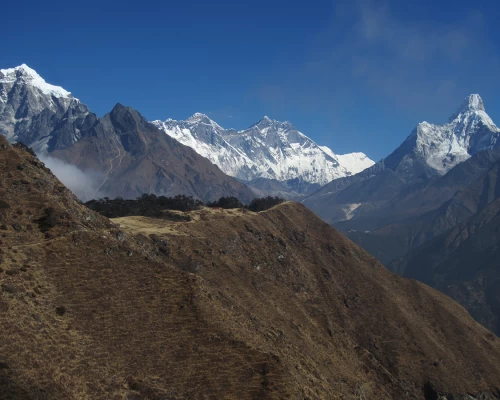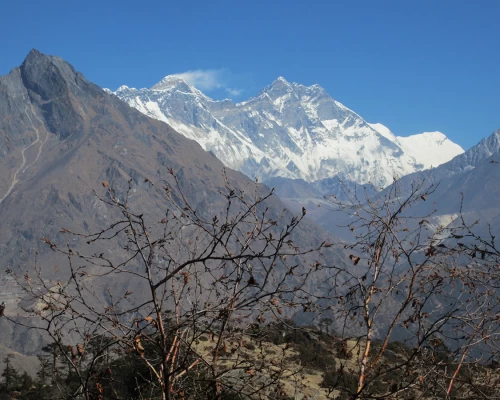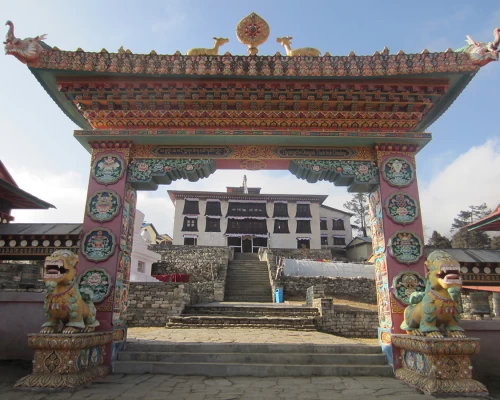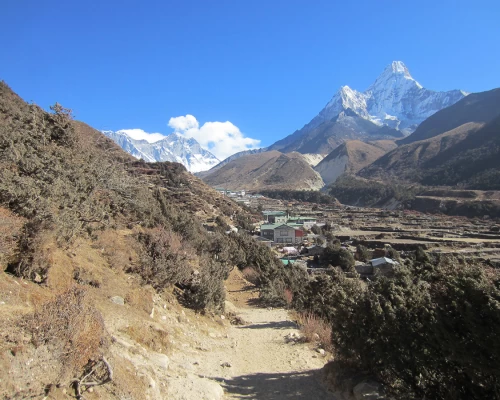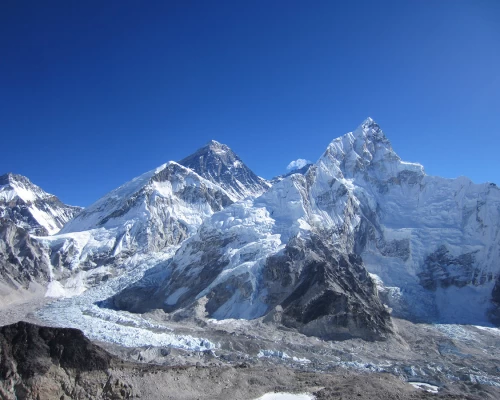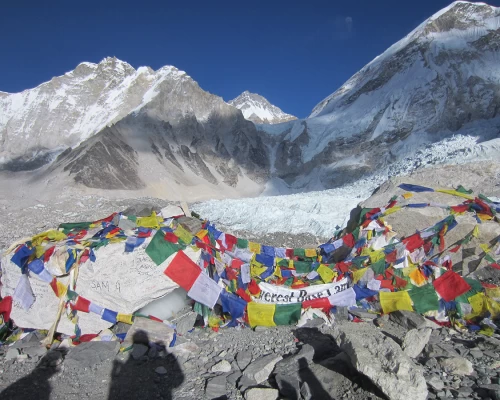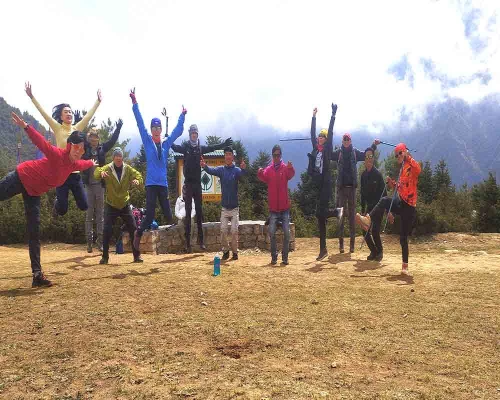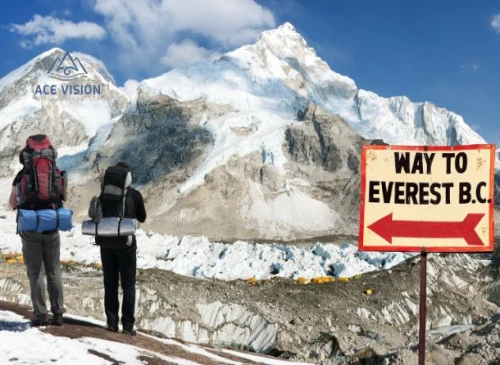Everest Base Camp Trek trail is surrounded by mountains and of course, Mt. Everest (Sagarmatha). Why Everest Base Camp Trek? The Everest Base Camp trail experience of mountain lifestyle with traditions and beliefs of communities like Sherpa, Rai, Limbu, Lama, etc. Moderate to difficult trekking venture that suits both beginner and experienced trekkers.
The 14-day Everest Base Camp Trek Itinerary, you traverse to base of highest mountain in the world and the journey goes famous viewpoint, Kala Patthar. How is the Trekking trail of EBC? The trail follows lush forests of rhododendron and magnolia during the first few days and gradually ascends above the treeline, where you navigate via glacier fields and moraines.
Are acclimatization-days important on Everest Base Camp Trek route?
Yes, the Everest base camp trek begins from Lukla, located at 2,846 meters (9,337 ft). On the second day of your trip, you'll fly from Kathmandu (1,400 m/4,600 ft) to Lukla, gaining almost 1,446 meters (4,737 ft). As this drastic change in elevation may trigger altitude sickness, we descend to Phakding village (2,610 m/8,563 ft) the same night, which will help us acclimatize.
To make sure you get ample time to adjust to the elevation while trekking. Ace Vision Treks travel expertise added two acclimatization days on our Everest trekking itinerary. The best thing about these rest days is you get to spend more time with locals in one place. Hotel Everest View (3,962 m/13,000 ft) and Nagarjuna Hill (5,100 m/16,732 ft) are our two acclimatization hiking points that offer breathtaking mountain panoramas.
Views during the trek & the locals (Sherpas)
Talking about the views of Everest base camp trek route offers stunning mountain views. From starting to the end of the trek, you captivated by the surreal presence of the mighty Himalayan mountains. Which mountains are notable on Everest Base Camp journey? The notable mountains on EBC Trails are: Lhotse (8,516 m/27,940 ft), Cho Oyu (8,188 m/26,864 ft), Makalu (8,481 m/27,825 ft), Kanchenjunga (8,586 m/28,169 ft), Everest (8,849 m/29,032 ft), Ama Dablam (6,812 m/22,349 ft), Thamserku (6,608 m/21,680 ft), etc.
You witness many gorgeous sunrises and sunsets during the trek. The trail is very adventurous. You trekking inside Sagarmatha National Park, home to many flora and fauna. The beautiful river valley, thrilling suspension bridges, uneven hillsides, and picturesque villages all add to the adventure. The locals are very welcoming and friendly too. Likewise, you visit ancient monasteries like Tengbohe (3,860 m/12,660 ft) and Pangboche (3,985 m/13,074 ft) on the way.
The EBC trek is a lifetime venture in the Himalayas of Nepal. The fresh Himalayan air, nourishing meals, kind natives, rich cultural heritage, and nature at its best will leave you enchanted. By the end of the trek, you feel light and rejuvenated. Ace Vision Treks offer the best Everest base camp trek cost and itinerary. There is no hidden charge or policy in our packages.
If you wish to escape the return trek, you can add a helicopter flight from Gorak Shep. As we have regular helicopter flights in the peak season, we can easily arrange for a group to share the flight, reducing the overall per-head cost significantly.
What if Lukla's flight gets canceled?
There are chances of Lukla's flight getting canceled, especially in the offseason. That's why we recommend having at least one buffer day in your itinerary. In case your flight is canceled, you can opt for a helicopter flight to Lukla from Kathmandu (extra cost included).
Important Notes for EBC Trek
- Refund- If you complete the trek ahead of schedule or leave the trek in the middle because of personal reasons or health issues, we cannot offer a refund for unused days. However, we do have a great refund policy for trek cancellations. Do note that we are obliged to pay our guides and porters even if you choose to leave the trek in the middle or complete it earlier. Similarly, we also have to bear the reservation charges, so we cannot offer a refund in some cases.
- Trip Extension: Yes, you can add extra days to your trip if you are doing a private trek with us. In the group trek, you have to let us know in advance.
- Alternative Treks: If you wish to do additional activities after your Everest base camp trekking for 14 days or looking for other similar packages, you can check out our site. These are some options for you- Nepal city tour, helicopter tour, Manaslu Circuit Trek, Annapurna base camp trek, Mardi Himal trek, Upper Mustang trek, etc. We also have a wide selection of Everest base camp trek packages.
- Group Trek: If you have joined one of our fixed departures or groups for the EBC trek, you can expect other trekkers in the group. Our groups are small & have a maximum of 8 trekkers at a time. In bigger groups, we also provide an assistant guide.
- If Lukla's flight gets canceled: There are chances of Lukla's flight getting canceled, especially in the offseason. That's why we recommend having at least one buffer day in your itinerary. In case your flight is canceled, you can opt for a helicopter flight to Lukla from Kathmandu (extra cost included).
Why Ace Vision Treks for Everest Base Camp Trekking?
- High Trip Success Rate: Our Everest Base Camp Trekking has high success rate because Ace Vision Treks plan carefully to ensure your journey goes smoothly.
- Nepali Local Crew Members: Ace Vision Teams are experience, which is secured your Everest Base Camp Trekking. Our Team is expertise in terrain, culture, and language well.
- Zero Hidden Costs: Ace Vision Treks package costs are clear from the start to end. Our private the transparency so no surprise charges during your trip.
- Easy Online Booking System: Go to bank and transfer deposit trip advance amount? Ace Vision Treks Company has easy trip booking system so staying at home and conform your Everest Base camp trek with us, which is user-friendly.
- Trekking and Tour Guides Preference: Ace Vision Treks Guides are license holder, who is friendly, knowledgeable, helpful, expertise for EBC, with honest.
- Our Hospitality: "Gust is our God"- Nepali slogan, we treat our gust as family member and provide warmth and respect. Your comfort and satisfaction are our priority.
- Service-oriented Trek Package: Ace Vision treks packages are service oriented but you can choose budget base trekking services. We include thoughtful services to meet your needs.
- Private Tours: Enjoy privacy and flexibility with private tours. Which is most secure way to value of traveler’s vacation and worth? Don't compromise in small price. Ace Vision Treks package perfect for families, couples, or solo travelers with beginner.
- What we do for your safety? Safety and security is our 1st priority, we never compromise for safety. Ace Vision treks expertise team carry first aid and train our guides in safety. We alert for Weather, altitude, and risks of the Himalayas.
- Last-minute Booking: Planning late? No problem. We accept and organize last-minute trips. But for Booked flight tickets to Lukla we need at least four weeks.
- Gear Advice and Provide: Ace Vision Treks provide Sleeping bag, duffle bag as well we help you choose the right gear. Don't have Trekking equipment? You can rent or buy in Thamel. Thamel is known as international tourist hub.


